Lithium batteries have revolutionized the RV industry while offering numerous advantages over traditional lead-acid batteries. With their lightweight design, higher energy density, and extended lifespan, lithium batteries are becoming the go-to choice for RV owners who often go boondocking/dry camping and look for a dependable and long-lasting power solution.
In this article, we will explore the 5 best RV lithium batteries available on the market. These batteries offer exceptional performance, advanced features, and the reliability needed for a smooth and worry-free RV experience. Whether you’re a full-time RVer or an occasional traveler, investing in one of these top-rated lithium batteries for RVs will undoubtedly enhance your adventures on the road.
In order to help you to make an informed decision, we also share all the basics about lithium batteries for RV including the pros and cons, their working mechanism, plus important factors to consider when buying a camper lithium battery. So let’s get started!
Contents
Are RV Lithium Batteries Worth the Investment?

An RV lithium battery is a new type of battery specifically designed for use in recreational vehicles (RVs). Unlike traditional lead-acid batteries commonly used in RVs, lithium batteries utilize advanced lithium-ion or lithium iron phosphate (LiFePO4) technology.
Lithium batteries offer several advantages over conventional batteries. One of the key benefits is their high energy density, which means they can store more energy in a compact and lightweight form. This makes lithium batteries ideal for RV applications where weight and space are important considerations.
Moreover, lithium batteries provide a higher usable capacity compared to lead-acid batteries. They can be discharged to a lower percentage of their capacity without causing damage, allowing for more available power for longer periods. This is known as the depth of discharge (DoD), and lithium batteries often have a higher DoD than lead-acid batteries.
Another advantage of RV lithium batteries is their faster charging capabilities. They can accept a higher charging current, allowing for shorter charging times and quicker recharging of the battery bank. This is especially useful for RVers who rely on solar panels or other renewable energy sources to charge their batteries.
Lithium batteries also have a longer lifespan compared to traditional batteries. They can endure more charge-discharge cycles, typically ranging from 2,000 to 5,000 cycles or more, depending on the specific battery chemistry and usage. This means they can last significantly longer and provide reliable power over many years of use.
Additionally, RV lithium batteries are known for their consistent power output throughout their discharge cycle. Unlike lead-acid batteries that experience voltage sag as they discharge, lithium batteries maintain a more stable voltage, providing a steady and reliable power supply for your RV’s electrical needs.
It’s important to note that RV lithium batteries require specific charging and management systems to ensure their optimal performance and longevity. These batteries often come with built-in Battery Management Systems (BMS) that protect against overcharging, deep discharging, and other potential issues.
While RV lithium batteries generally come at a higher upfront cost compared to lead-acid batteries, their longer lifespan, higher efficiency, lighter weight, and other advantages make them a popular choice among RV enthusiasts who prioritize performance, reliability, and energy efficiency in their power systems.
The Pros
- Light weight & compact
- Longer lifespan
- Higher efficiency
- Fast charging
- Low self-discharge rate
- No maintenance required
- Less susceptible to vibration and temperature extremes
The Cons
- High initial cost
- Not as widely available as lead-acid batteries
- Requires a battery management system (BMS)
How Does an RV Lithium Battery Work?
An RV lithium battery works based on the principles of lithium-ion or lithium iron phosphate (LiFePO4) technology. These batteries utilize chemical reactions within their cells to store and release electrical energy. Here’s a detailed explanation of how an RV lithium battery works:
Cell composition: An RV lithium battery consists of multiple individual cells connected together in a series or parallel configuration. Each cell contains a positive electrode (cathode), a negative electrode (anode), and a separator that prevents direct contact between the electrodes.
Electrolyte: The cells of a lithium battery contain an electrolyte, which is a conductive solution or gel that facilitates the movement of ions between the electrodes. The electrolyte is typically a lithium salt dissolved in an organic solvent or a solid polymer electrolyte in the case of LiFePO4 batteries.
Charging process: When an external power source, such as a charger or a solar panel, is connected to the RV lithium battery, the charging process begins. During charging, a voltage is applied across the battery terminals, causing lithium ions to migrate from the positive electrode to the negative electrode.
Lithium-Ion movement: As the lithium ions move through the electrolyte, they pass through the separator and intercalate into the crystal lattice of the negative electrode material. This process is known as intercalation or insertion.
Electrochemical reactions: At the positive electrode, the intercalated lithium ions are released from the crystal lattice and move back into the electrolyte. This release of lithium ions involves electrochemical reactions that store energy within the battery.
Discharging process: When the RV’s electrical system requires power, the discharging process begins. The stored lithium ions move from the negative electrode back to the positive electrode through the electrolyte, providing a flow of electrons that powers the RV’s appliances and devices.
Voltage output: As the lithium ions migrate, an electrical potential difference is created between the battery terminals, resulting in a voltage output. This voltage remains relatively stable during the discharge cycle, providing consistent power output until the battery’s capacity is depleted.
Battery Management System (BMS): An RV lithium battery often includes a built-in Battery Management System (BMS) that monitors and controls various parameters. The BMS ensures the battery operates within safe voltage limits, protects against overcharging and deep discharging, balances cell voltages, and provides temperature monitoring and protection.
Efficiency and self-discharge: RV lithium batteries are known for their high energy efficiency, meaning they can convert a significant portion of the stored energy into usable power. They also have a low self-discharge rate, which means they can retain their charge for longer periods without significant loss.
Rechargeability: An RV lithium battery is designed to be rechargeable, allowing it to undergo multiple charge-discharge cycles. This rechargeability enables the battery to be used repeatedly and provides a long service life compared to non-rechargeable batteries.
By harnessing the electrochemical reactions of lithium ions, an RV lithium battery can store and release electrical energy efficiently, providing a reliable and long-lasting power source for various applications in recreational vehicles.
Lithium Batteries vs Lead-Acid Batteries for RVs
Lithium batteries and lead-acid batteries are two popular options for powering RVs. Here’s a comparison between the two:
Energy Density
Lithium batteries have a higher energy density compared to lead-acid batteries. This means that lithium batteries can store more energy in a smaller and lighter package, allowing for increased power capacity without taking up as much space in the RV.
Weight
Lithium batteries are significantly lighter than lead-acid batteries. This weight advantage is particularly beneficial for RVs, as it helps to reduce the overall weight of the vehicle, leading to improved fuel efficiency and increased cargo carrying capacity.
Depth of Discharge (DOD)
Lithium batteries can be discharged to a much lower depth (typically 80-90%) without significantly impacting their lifespan. On the other hand, lead-acid batteries should not be discharged below 50% to maintain their longevity. This means that lithium batteries offer more usable capacity and allow for a longer runtime between charges.
Charging efficiency
Lithium batteries have a higher charging efficiency compared to lead-acid batteries. They can accept a charge at a faster rate, allowing for quicker charging times. Additionally, lithium batteries can be charged up to 100% without any negative effects on their lifespan, while lead-acid batteries may experience reduced lifespan if overcharged.
Lifespan
Lithium batteries have a longer lifespan compared to lead-acid batteries. While lead-acid batteries typically last around 3-5 years, lithium batteries can last 10-15 years or more with proper care and maintenance. This longer lifespan translates to cost savings over time, despite the higher upfront cost of lithium batteries.
Maintenance
Lead-acid batteries require regular maintenance, including checking and adding distilled water, equalizing charges, and cleaning terminals. In contrast, lithium batteries are virtually maintenance-free and do not require the same level of attention.
Voltage Stability
Lithium batteries maintain a more stable voltage throughout their discharge cycle, providing consistent power output until near depletion. Lead-acid batteries, on the other hand, exhibit voltage drop as they discharge, resulting in a gradual reduction in power output.
Environmental Impact
Lithium batteries are considered more environmentally friendly compared to lead-acid batteries. They do not contain toxic substances like lead and acid, making them safer to handle and dispose of. Additionally, lithium batteries are more easily recyclable and have a lower carbon footprint.
Cost
Lithium batteries have a higher upfront cost compared to lead-acid batteries. However, considering their longer lifespan, higher efficiency, and other advantages, they can provide better value for money in the long run.
| Feature | Lithium Batteries | Lead-Acid Batteries |
|---|---|---|
| Cost | Expensive upfront cost | Cheap |
| Weight | Much lighter | Much heavier |
| Capacity | More energy dense | Less energy dense |
| Lifespan | Longer lifespan | Shorter lifespan |
| Depth of discharge | Can be discharged more deeply | Can only be discharged to 50% |
| Charging time | Faster charging time | Slower charging time |
| Maintenance | Less maintenance required | Regular maintenance required |
| Environmental impact | Environmentally friendly | Less friendly to environment |
Overall, while lead-acid batteries have been the traditional choice for RVs, lithium batteries offer significant advantages. They are particularly well-suited for those seeking increased power capacity, longer runtime, and a lighter overall RV setup.
Best Lithium Batteries For RVs: Top 5 Picks
1. Renogy 12V 100Ah Lithium LiFePO4 Deep Cycle Battery
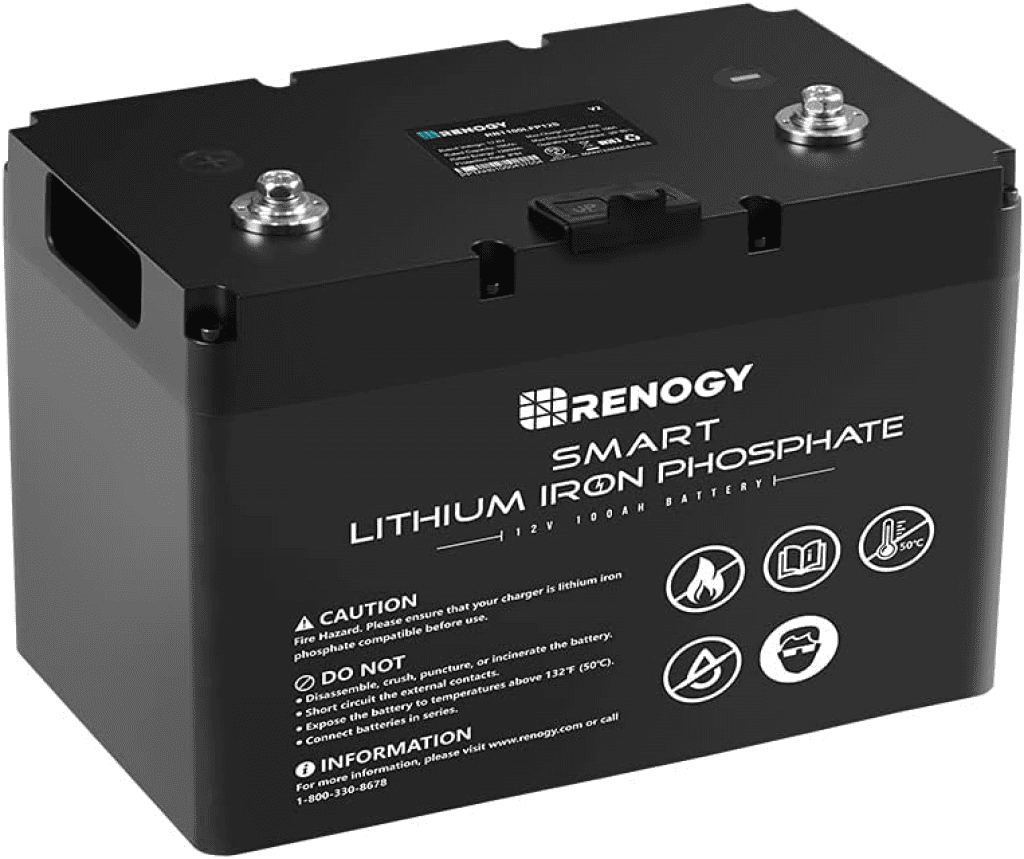
At a glance:
| Brand | Renogy |
| Nominal Voltage | 12.8 V |
| Capacity | 100Ah |
| Max Charge Current | 50A |
| Storage Temperature | -13 to 149℉ (-25 to 65℃) |
| Cycle Life | 4,000 cycles |
| Weight | 26 lbs |
| Dimension | 6.8 x 7.4 x 11.4 inches |
| Warranty | 5 years |
Why we love it:
The Renogy 12V 100Ah Lithium LiFePO4 Deep Cycle Battery is a cutting-edge energy storage solution that combines advanced technology with superior performance. This battery stands out with its integrated smart BMS, which not only provides protection against abnormal conditions but also actively monitors and manages the charging and discharging process. The BMS offers over 20 protections, ensuring the battery’s safety and allowing a peak current of 150A to pass through. Additionally, the battery features 50% more heat dissipation area, maximizing safety during off-grid use.
One of the standout features of the Renogy Smart Lithium Iron Phosphate Battery is its ability to enable auto-balance among parallel connections. This functionality provides greater flexibility for battery connection, making it easy to connect multiple batteries in parallel (up to 8). The auto-balancing function improves the average charging efficiency for the batteries in the long term, ensuring optimal performance and longevity. Moreover, the battery includes an activation switch cable, allowing for the convenient on/off control of multiple parallel batteries during installation and use, enhancing safety and ease of operation.
Real-time monitoring is another notable feature of the Renogy 12V 100Ah Lithium LiFePO4 Deep Cycle Battery. With the improved RS485 UP Communication Port, the battery can communicate and transfer data in real time. By using a Renogy Bluetooth Module BT2, users can export the data into comprehensible information, which can be conveniently streamed straight to a mobile phone or monitored live with a Renogy monitoring screen.
The Renogy battery utilizes next-level pouch cells that undergo rigorous testing to ensure durability and safety. These cells surpass severe high-temperature and puncture tests, minimizing the risk of fire or explosion. Notably, the battery cell not only meets the UL1642 standard but also offers an impressive lifespan of over ten years, with more than 4000 cycles at 80% depth of discharge (DOD). This exceptional lifespan ensures long-term reliability and reduces the need for frequent battery replacements.
Whether you’re powering an off-grid system or require reliable energy storage, the Renogy 12V 100Ah Lithium LiFePO4 Deep Cycle Battery is a top choice for its exceptional features and performance.
2. LiTime 12V 100Ah LiFePO4 Battery
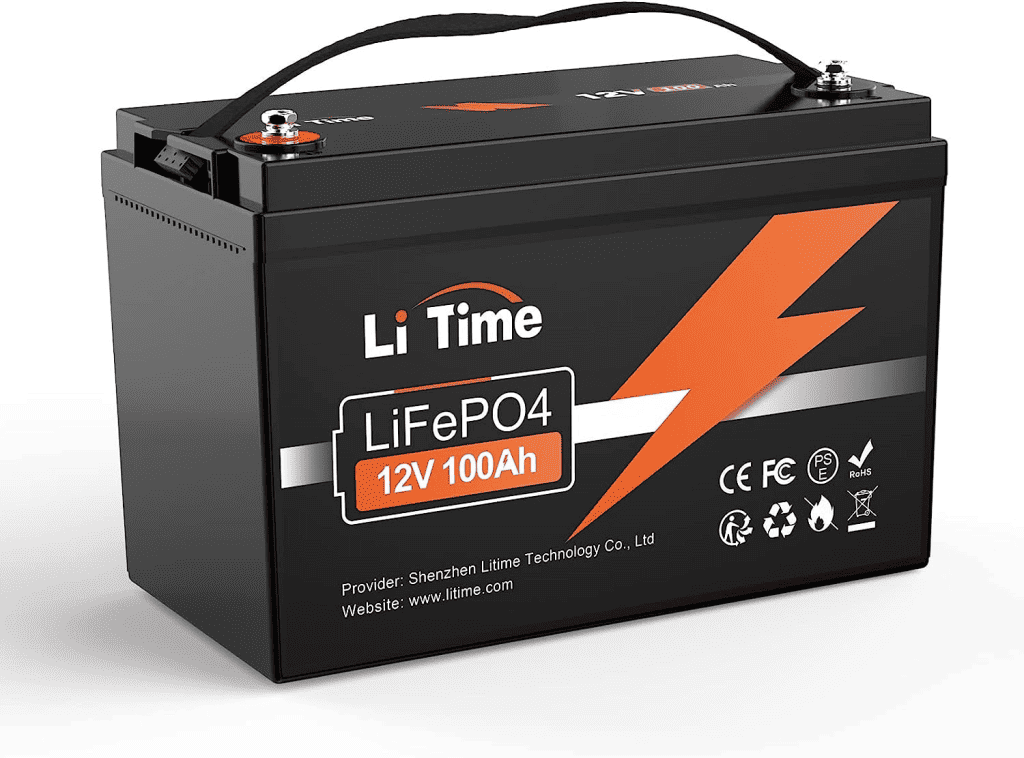
At a glance:
| Brand | LiTime |
| Nominal Voltage | 12.8V |
| Capacity | 100Ah |
| Max Charge Current | 100A |
| Cycle Life | 4,000-15,000 cycles |
| Weight | 24.25 lbs |
| Dimension | 13 x 6.77 x 8.43 inches |
| Warranty | 5 years |
Why we love it:
The LiTime 12V 100Ah LiFePO4 Battery is a remarkable energy storage solution that excels in terms of quality, performance, and safety. Manufactured using Automotive Grade LiFePO4 Cells, this battery offers a higher energy density, exceptional stability, and greater power output. It has earned the prestigious UL Testing Certificate, which ensures the highest level of safety for the cells inside the battery. With these outstanding features, the LiTime 12V 100Ah LiFePO4 Battery is an ideal choice for various applications such as RVs, campers, and off-grid setups.
The LiTime LiFePO4 battery features the flat discharge curve, which remains above 12.8V for up to 95%* of its capacity usage. This translates into significantly extended run-time compared to traditional Lead Acid batteries, which typically only utilize around 50% of their capacity. Whether you’re engaging in outdoor camping adventures or require a battery for indoor installations, this product offers astronomical boosts in performance and reliability. Moreover, the LiTime LiFePO4 battery does not suffer from memory effect, meaning it can be used immediately after charging regardless of its previous state.
Another impressive aspect of the LiTime 12V 100Ah LiFePO4 Battery is its powerful Battery Management System (BMS) protection. This advanced system safeguards the battery against a range of potential issues, including overcharging, overcurrent, overdischarge, short circuiting, and high-temperature cut-offs. With the BMS in place, you can have peace of mind knowing that your battery is well-protected and operating optimally.
In addition to its exceptional performance and safety features, the LiFePO4 battery from LiTime is also known for its lightweight design. Weighing just 24.25 lbs per module, it is significantly lighter than lead acid batteries of the same capacity, weighing only 1/3 of their bulk. This lightweight nature makes it easier to handle and transport, which is especially beneficial for mobile applications where weight considerations are critical.
The LiTime LiFePO4 battery is also praised for its longevity. It provides an outstanding cycle life of 4000 to 15000 cycles, which is ten times longer than traditional lead acid batteries. This remarkable durability ensures a lifespan of 10 years, as opposed to the 3-year lifespan commonly found in lead acid batteries.
4. Redodo 12V 100Ah LiFePO4 Lithium Battery
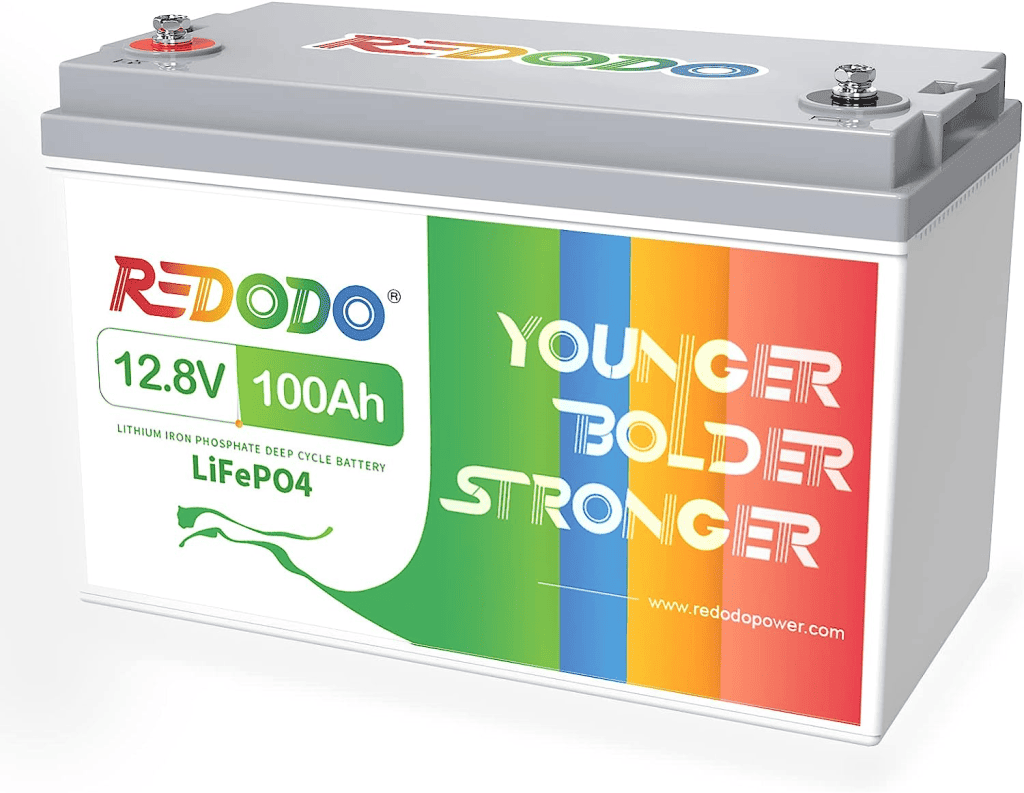
At a glance:
| Brand | Redodo |
| Nominal Voltage | 12.8V |
| Capacity | 100Ah |
| Max Charge Current | 100A |
| Cycle Life | 4,000-15,000 cycles |
| Weight | 25.35 lbs |
| Dimension | 12.99 x 6.82 x 8.46 inches |
| Warranty | 5 years |
Why we love it:
The Redodo 12V 100Ah LiFePO4 Lithium Battery is a top-tier energy storage solution with advanced technology and outstanding performance. It offers ample battery capacity and supports battery expansion for up to 4 series and 4 parallel connections, making it suitable for a wide range of applications, particularly electric energy storage needs.
One of the key features of the Redodo LiFePO4 battery is its high energy density, which ensures long-term recycling capabilities. The monomer within the battery maintains a capacity greater than 80%, enabling it to be repeatedly charged and discharged without experiencing any memory effect. This means that the battery can be used and charged regardless of its current state, providing consistent and reliable performance.
In addition, the Redodo LiFePO4 battery is also an environmentally friendly option. It does not contain heavy metals or rare metals, making it a greener choice compared to other battery technologies. This eco-conscious design is highly valued in outdoor power sources and contributes to the battery’s widespread use across various application scenarios.
The Redodo LiFePO4 battery boasts an exceptional lifespan and durability. It can be recycled up to 4,000 to 15,000 times, ensuring a long-lasting service life of up to 10 years. This longevity sets it apart from other battery options, reducing the need for frequent replacements and offering significant cost savings in the long run.
Moreover, Redodo is recognized for its commitment to professional service. They provide a five-year warranty for their batteries and have a responsive service team that addresses customer concerns promptly. Their team usually analyzes and solves customer problems within 24 hours.
5. Battle Born Batteries LiFePO4 Deep Cycle Battery
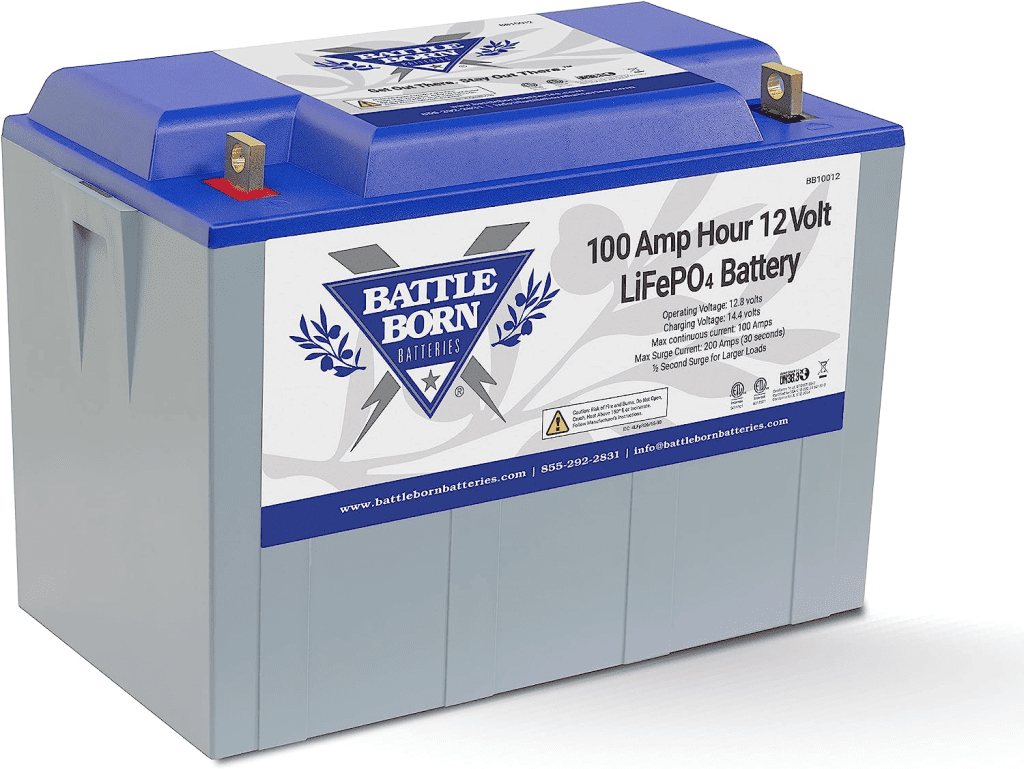
At a glance:
| Brand | Battle Born Batteries |
| Nominal Voltage | 12V |
| Capacity | 100Ah |
| Weight | 31 lbs |
| Dimension | 12.76 × 6.86 × 8.95 inches |
| Warranty | 10 years |
Why we love it:
The Battle Born Batteries LiFePO4 Deep Cycle Battery is a rugged and reliable power solution designed to meet the demands of various applications, making it the perfect choice for adventurous individuals and those seeking dependable off-grid power.
One of the standout features of the Battle Born Batteries LiFePO4 Deep Cycle Battery is its built-in BMS. This integrated system provides comprehensive protection against extreme temperatures, high and low voltages, short circuits, and other common causes of battery failure. The BMS ensures the battery remains safe and operates optimally, even in challenging conditions. This level of protection gives users peace of mind, knowing their battery is well-equipped to handle the rigors of rugged adventures and demanding power needs.
The Battle Born Lithium Battery is also eco-conscious and lightweight. The absence of acid in the battery’s composition eliminates the risk of leaks and spills, making it an environmentally friendly choice and allowing for safe mounting in any orientation. This flexibility in mounting options makes it easier to integrate the battery into various setups and installations.
Plus, this Battle Born battery offers versatility when it comes to wiring options. It can be wired in series or parallel, providing users with flexibility in configuring their power systems to meet their specific needs. This adaptability allows for greater customization and efficiency in energy storage setups.
6. ExpertPower 12V 100Ah Lithium LiFePO4 Deep Cycle Rechargeable Battery
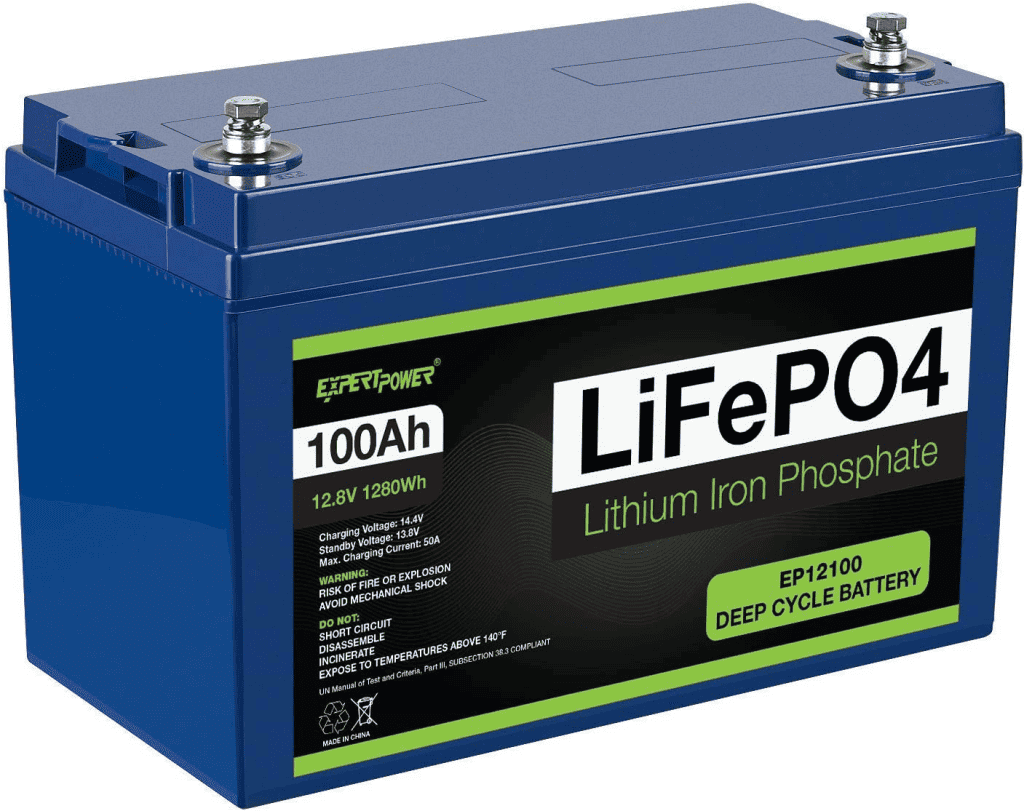
At a glance:
| Brand | ExpertPower |
| Nominal Voltage | 12.8V |
| Capacity | 100Ah |
| Max Charge Current | 100A |
| Weight | 22.6 lbs |
| Dimension | 13 x 6.8 x 8.4 inches |
| Warranty | 1 year |
Why we love it:
With its exceptional performance and comprehensive safety features, the ExpertPower LiFePO4 battery is also featured in our top picks for the best RV battery. With its flat discharge curve, it maintains a voltage above 12V for up to 95% of its capacity usage. This means significantly longer run-times compared to SLA batteries.
Weighing only a third of the weight of equivalent Lead Acid batteries, it offers exceptional portability and makes it the clear choice for applications where weight considerations are important, such as RV camping and off-grid application. The reduced weight enhances mobility and ease of use without compromising on power and performance.
Complete protection is another highlight of the ExpertPower lithium battery. It is equipped with a built-in BMS that safeguards the battery from various potential issues, including overcharging, deep discharge, overloading, overheating, short circuits, and excessive low self-discharge rates. This comprehensive protection ensures the longevity and reliability of the battery, allowing for worry-free operation. The built-in low-temp cut-off feature prevents charging under 23 °F (-5 °C), further enhancing the battery’s safety and performance in challenging temperature conditions.
How to Choose The Best Lithium Battery for RV?
Choosing the best lithium battery for your RV requires careful consideration of several factors to ensure optimal performance and compatibility with your specific needs. Here are some key things to consider when looking for a lithium battery for your RV:
Battery Capacity
The capacity needed from an RV lithium battery depends on the power requirements of your specific RV and how you intend to use it.
Lithium-ion batteries, including lithium iron phosphate (LiFePO4) batteries, are designed to provide usable capacity throughout their entire discharge cycle. Unlike SLA batteries, which have a limited depth of discharge (DoD) to maintain their lifespan, lithium-ion batteries can be discharged to almost their full capacity without significant negative effects on their performance or longevity. For that reason, if you use a lithium battery for your camper, a 100Ah is enough.
For a small RV, such as a camper van or Class B RV, which typically has fewer power-consuming appliances, a lithium battery capacity ranging from 50-100Ah should be sufficient.
For larger motorhomes, a higher capacity lithium battery in the range of 200Ah to 400Ah or more would be recommended. This increased capacity ensures an extended runtime for these power-hungry appliances and provides more flexibility during off-grid adventures.
The actual capacity needed may vary depending on your specific power usage habits, duration of trips, and the number of occupants in your RV. It’s always a good idea to assess your power requirements by calculating the total wattage of the appliances you plan to use and estimating the desired runtime to determine the appropriate battery capacity for your RV.
Cycle Life
The cycle life of RV lithium batteries refers to the number of charge and discharge cycles a battery can undergo while maintaining a certain level of performance. It represents the battery’s overall lifespan and durability in terms of repeated usage.
Typically, RV lithium batteries have a cycle life ranging from 2000 to 5000 cycles or more. This means the battery can be charged and discharged up to that number of times before its capacity starts to significantly degrade. It’s important to note that the cycle life is often specified based on a specific depth of discharge (DoD), which indicates the amount of capacity used during each cycle.
For example, a lithium battery with a cycle life of 3000 cycles at 80% depth of discharge (DoD) means it can be charged and discharged up to 3,000 times while utilizing 80% of its total capacity before experiencing a noticeable decrease in performance.
Choose a lithium battery with a high cycle life to ensure longevity and cost-effectiveness. Additionally, consider the overall lifespan of the battery, as longer-lasting batteries provide better value in the long run.

Energy Density
The energy density of RV lithium batteries refers to the amount of energy that can be stored within a given volume or weight of the battery. It is a measure of how much energy the battery can provide per unit of space or mass.
Lithium batteries are known for their high energy density compared to other battery chemistries like lead-acid. The energy density of RV lithium batteries is typically expressed in watt-hours per kilogram (Wh/kg) or watt-hours per liter (Wh/L).
The exact energy density can vary depending on the specific lithium battery technology and design. However, as a general range, RV lithium batteries can have energy densities ranging from around 100 Wh/kg to over 200 Wh/kg, and from 200 Wh/L to 400 Wh/L or more.
The high energy density of lithium batteries is a significant advantage for RV applications, as it allows for greater storage capacity in a smaller and lighter form factor. This means that RV owners can have more power available while minimizing the weight and space requirements of the battery system. And of course, the higher the better when looking for lithium battery for your camper.
Battery Management System (BMS)
A Battery Management System (BMS) is a critical system that oversees the operation and performance of lithium-ion battery packs. It comprises integrated firmware and hardware components responsible for monitoring the battery’s health, managing its charging and discharging processes, and ensuring safe operation.
A typical BMS includes the following components:
- Voltage sensor: Measures the voltage of each cell within the battery pack.
- Current sensor: Monitors the current flowing into and out of the battery pack.
- Temperature sensor: Tracks the temperature of the battery pack to prevent overheating.
- Controller: Utilizes data from the sensors to manage and control the battery pack.
The BMS performs several important tasks based on the data it collects:
- Cell balancing: Equalizes the voltage levels of individual cells to prevent overcharging or overdischarging, which can harm the battery’s longevity.
- Overcharge and over-discharge protection: Safeguards the battery from being charged beyond safe limits or discharged to critically low levels, which can lead to damage.
- Health monitoring: Monitors the battery’s performance and condition, issuing alerts if any abnormalities are detected.
- User communication: Interfaces with the user through displays or computer interfaces, enabling monitoring of battery health and performance, as well as configuration of BMS settings.
A BMS is an indispensable component for lithium-ion battery packs as it ensures safe charging and discharging, protects against damage, and extends the battery’s overall lifespan. Make sure to get a lithium battery with a built-in BMS.
Safety Features
Besides the built-in BMS, you should also look for a lithium battery for RV with following safety features:
- Thermal Protection: Lithium batteries incorporate thermal sensors that monitor the battery’s temperature. If the temperature exceeds safe limits due to external factors or high current loads, the BMS takes action to regulate or cut off the charging or discharging process, preventing overheating and potential safety risks.
- Cell Balancing: Lithium batteries often include a cell balancing feature to ensure that individual cells within the battery pack are evenly charged and discharged. This helps maintain the overall health and performance of the battery by preventing imbalances that can lead to cell degradation or failure.
- Low-Temperature Cut-Off: Some RV lithium batteries have a low-temperature cut-off feature that prevents charging at extremely low temperatures. Charging at low temperatures can cause damage to the battery, so this feature ensures that charging is temporarily suspended until the temperature rises to a safe level.
Brand
There are several reputable brands in the market known for producing high-quality RV lithium batteries. While individual preferences may vary based on specific needs and requirements, here are some of the best brands known for their RV lithium batteries:
- Battle Born Batteries: Battle Born Batteries is a renowned brand recognized for their durable and reliable lithium batteries. They offer a range of battery options with excellent performance, long lifespan, and advanced safety features. Their batteries are well-regarded for their performance in various RV and off-grid applications.
- Renogy: Renogy is a trusted brand that offers a wide selection of RV lithium batteries. Their batteries are known for their high energy density, durability, and efficient power delivery. Renogy provides batteries suitable for different RV sizes and power requirements, and their products are backed by excellent customer support.
- ExpertPower: ExpertPower is known for its reliable and efficient lithium batteries designed for RV and marine applications. Their batteries offer impressive power density, long cycle life, and comprehensive safety features. ExpertPower is highly regarded for their lightweight and compact designs, making them a popular choice among RV enthusiasts.
Budget
It’s important to set a budget before you start shopping for an RV lithium battery. This will help you narrow down your options and avoid overspending.
On average, RV lithium batteries can range from around $500 to $2,500 in price. However, the price of an RV lithium battery varies depending on several factors such as the capacity and the manufacturer.
The higher the capacity, the more expensive the battery will be. At the same time, with some prestigious manufacturers, such as Battle Born or Renogy, who are known for their high-quality batteries, their batteries are usually more expensive.
If you are considering buying an RV lithium battery, it is recommended to compare prices from different manufacturers and get what is best for your need within the set budget.
FAQs About Camper Lithium Batteries
Is it worth switching to an RV lithium battery?
Switching to an RV lithium battery can be worth it for many RV owners.
Lithium batteries offer several advantages over traditional lead-acid batteries. They provide a higher energy density, which means they can store more power in a smaller and lighter package. Lithium batteries also have a longer lifespan, allowing for more cycles of charging and discharging. They charge faster, have a higher charge retention rate, and can withstand deeper discharges without affecting their overall performance.
Additionally, lithium batteries are maintenance-free and don’t require regular maintenance like lead-acid batteries. While the upfront cost of lithium batteries is higher, their long-term benefits and improved performance can make them a worthwhile investment for RV owners looking for enhanced power storage capabilities and reliability.
How long does a lithium battery for RV last?
A lithium battery for an RV typically has a lifespan of 10 to 15 years, making it a durable and long-lasting power storage solution for RV applications.
Do you need a special charger for lithium-ion batteries?
Yes, lithium-ion batteries require a special charger designed specifically for lithium-ion chemistry. These chargers are designed to provide the appropriate voltage and charging algorithm to safely and efficiently charge lithium-ion batteries. Using a charger not intended for lithium-ion batteries can result in improper charging, reduced performance, and potentially even damage to the battery.
